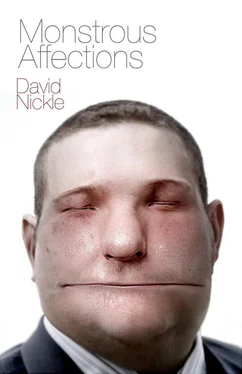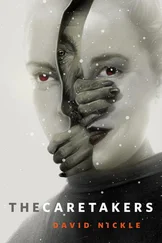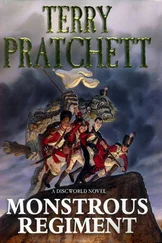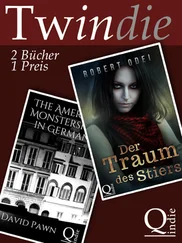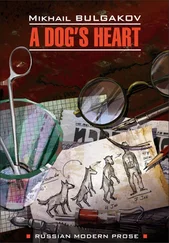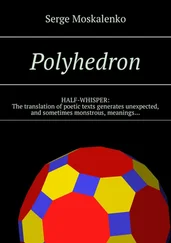David Nickle - Monstrous Affections
Здесь есть возможность читать онлайн «David Nickle - Monstrous Affections» весь текст электронной книги совершенно бесплатно (целиком полную версию без сокращений). В некоторых случаях можно слушать аудио, скачать через торрент в формате fb2 и присутствует краткое содержание. Город: Toronto, Год выпуска: 2009, ISBN: 2009, Издательство: ChiZine Publications, Жанр: Ужасы и Мистика, на английском языке. Описание произведения, (предисловие) а так же отзывы посетителей доступны на портале библиотеки ЛибКат.
- Название:Monstrous Affections
- Автор:
- Издательство:ChiZine Publications
- Жанр:
- Год:2009
- Город:Toronto
- ISBN:978-0-9812978-3-5
- Рейтинг книги:5 / 5. Голосов: 1
-
Избранное:Добавить в избранное
- Отзывы:
-
Ваша оценка:
- 100
- 1
- 2
- 3
- 4
- 5
Monstrous Affections: краткое содержание, описание и аннотация
Предлагаем к чтению аннотацию, описание, краткое содержание или предисловие (зависит от того, что написал сам автор книги «Monstrous Affections»). Если вы не нашли необходимую информацию о книге — напишите в комментариях, мы постараемся отыскать её.
Can it be love?
Monstrous Affections — читать онлайн бесплатно полную книгу (весь текст) целиком
Ниже представлен текст книги, разбитый по страницам. Система сохранения места последней прочитанной страницы, позволяет с удобством читать онлайн бесплатно книгу «Monstrous Affections», без необходимости каждый раз заново искать на чём Вы остановились. Поставьте закладку, и сможете в любой момент перейти на страницу, на которой закончили чтение.
Интервал:
Закладка:
James shook his head. “I don’t have much time for that, what with my schedule.”
His mother smiled and patted his hand. “Well, you’ve got time to come home when I need you most. That’s a blessing.”
“They gave me ten days,” said James. His mother’s smile faltered, so he added: “I’m sure I can arrange a little more.”
“Oh.” The smile returned. “Well, good.”
“Now. Was it the derailment? That—”
“That killed your father?” James’s mother folded her hands in front of her and fixed her eye on the Bible. “Not directly. I can’t believe you hadn’t heard of it. There was a newspaper man who came all the way from Seattle to interview me and take pictures. He said it’d play in all the Hearst papers, what with the circus angle. Biggest one since 1918, he said. I’d have written more if I’d known.”
James frowned. “The circus angle?”
“It was a circus train,” she said, sighing. “Twillicker and Baines Circus. Come down from Canada. Old steam engine, six rickety old freight cars and a couple of Pullmans. Wasn’t even supposed to stop here…”
“Ah.” James nodded. He did remember the story now — the Twillicker and Baines wreck had come up a couple of times while he was in makeup. The circus train had derailed somewhere “up north.” There’d been a kerosene fire. Some animals had gotten loose. A lot of people had been killed. There was a number, but he couldn’t remember what it was. He shut his eyes — as much in shame as in grief. Maybe someone had said the word Chamblay in connection with the wreck. If they had, James just hadn’t made the connection between the wreck and his home. Even when his mother told him of his father’s death.
What did that say about him?
“There there, dear.” His mother patted his hand. “It’s been a long day’s drive for you. I see that pretty car of yours outside. You don’t want to hear about your father right now. Why don’t you get some sleep? Lots of time to talk in the morning.”
“I’ll sleep in a moment.” James opened his eyes and took his mother’s hand in his and looked her in the eye. It had been years since he’d fled Chamblay, and every one of those years showed in her face. Now grief was added to the mix. She looked very old. “Tell me about Dad now.”
His mother nodded. “The train wreck happened in the middle of the night. They’re still trying to figure exactly how, because there wasn’t any other train involved. It made a terrible noise, though. Sounded like the ground was being torn. Your Dad — well, he went out to see what was what. You know how he could get.”
James didn’t answer. He did know how his Dad could get. Old Nick Thorne had a reputation to uphold in the town: he was the strongest and most capable man there was, after all. A terrible explosion sounds off in the middle of the night? He’d be out there in a flash.
“He joined the fire crew. The wreck was just a mile south of the station house, so he hopped on the back of the truck as it passed. Last time I saw him alive.”
“Was he caught in the fire?”
James’s mother shook his head. Tears were thick in the corners of her eyes. They gleamed in the kerosene light, as her mouth turned down and her brow crinkled angrily.
“Trampled,” she spat. “Crushed underfoot. By that damned elephant .”
James’s bed was as he remembered it: an iron-framed monstrosity, barely wide enough for one with a mattress that sagged deep in the middle. If two people got on that bed, its rusted springs would scream to wake the dead. Otherwise, there were few possessions left in the room. He stopped his mother from apologizing.
“I’ve been away a long time,” he said. “It’s fine. Now go to bed.”
The room had a small window in it that overlooked the town. Light poured in from below, painting squares on the ceiling and walls. It reflected back from a small tin mirror nailed onto the opposite wall. His mother absently straightened it. James took her gently by the shoulder and led her to the door.
“Bed,” he said firmly.
When she was gone, he undressed himself, hanging his trousers and shirt on a hook by the closet. He sat on the bed for a moment — listened to it squeak as he bounced a little. The briefest flash of nostalgia overcame him, then — of another night, when he felt the bristles of his friend Elmer Wolfe’s neck against his shoulder… When the springs screamed, loud enough…
…loud enough…
“A Cyclops!” James snapped his fingers. That’s what you called a giant with an eye in the middle of his forehead. He’d seen drawings years ago, in the old Bullfinch’s Mythology they had at the schoolhouse. A huge, one-eyed man who lived in a cave and was ultimately blinded by a gang of Greek sailors.
James went to the mirror. The light from the window was enough to see himself by. But the mirror made him into a funhouse image — his chin was cartoonishly long; the thin moustache he’d cultivated for his Captain Kip role looked as though it’d been drawn by a drunkard. He leaned closer and it was better: the nearer you get to a bad mirror, the less the distortion.
Finally, he found he was literally looking himself in the eye. Just inches from the mirror, his own eye seemed huge. The light was wrong to make out the colour — but it took little imagination to paint his iris yellow and green. To imagine the iris — big and black as an Idaho sky. He could lose himself in that eye. No, scratch that: he wanted to lose himself in that eye.
“Mmm,” said James. His hand crept down to his crotch — took hold. He smiled. Shut his eyes. How would it be, he wondered, to lick that thing — that massive thing, while hands as wide as his back squeezed his shoulders; a thumb as wide as a post gently, maybe even painfully, spread his cheeks.
Eyes still closed, he backed across the room to the freshly sheeted bed and fell into it — lost already in a fevered and vivid dream.
James and his mother spent the next morning at the Simmons Brothers Funeral Parlour in town. His mother had made pretty much all the arrangements before he’d arrived in town. It was going to be a good burial, in the Chamblay Hill Cemetery, with a nice oak casket and a polished headstone made of granite. It was far more than his mother could afford on her own. James made out three large cheques, while Mr. Simmons prattled on about the tragedy of the train wreck and the evil of circus folk and the better place that Nick Thorne had gone to. When they were finished, James took Mr. Simmons aside.
“Tell me,” he said quietly, “what really happened to my father. It was no elephant — was it?”
Mr. Simmons crossed his arms and lowered his head.
“An elephant,” he said carefully, “was involved. But no.”
“Not an elephant,” said James. “But it was a big thing.” He took a leap. “A — Cylcops, I heard.”
Mr. Simmons fixed him with a glare. “Circus folk,” he said sharply. “Circus folk have all manner of queerness to them. Giants and midgets and clowns and trapeze artists. Big enough man can call himself a Cyclops if he wants. I should stay well clear of them, if I were you, son.”
“Where are they?”
“By the creek — camped like wicked hoboes in the North Brothers’ common. But they won’t be there for long.”
James suppressed a smile. Wicked hoboes . “I see.”
Mr. Simmons’ glare faded. “I’m sorry,” he said. “I’ve buried nine good men who lost their lives trying to put out the fire on that train wreck. Your father far from the least of them. Contrary to what some might say — a busy day’s no pleasure for an undertaker.”
“I’m sure it’s not,” said James.
Читать дальшеИнтервал:
Закладка:
Похожие книги на «Monstrous Affections»
Представляем Вашему вниманию похожие книги на «Monstrous Affections» списком для выбора. Мы отобрали схожую по названию и смыслу литературу в надежде предоставить читателям больше вариантов отыскать новые, интересные, ещё непрочитанные произведения.
Обсуждение, отзывы о книге «Monstrous Affections» и просто собственные мнения читателей. Оставьте ваши комментарии, напишите, что Вы думаете о произведении, его смысле или главных героях. Укажите что конкретно понравилось, а что нет, и почему Вы так считаете.
